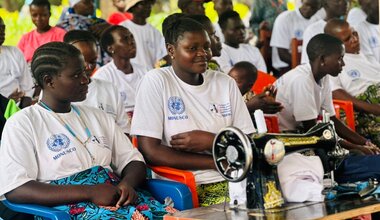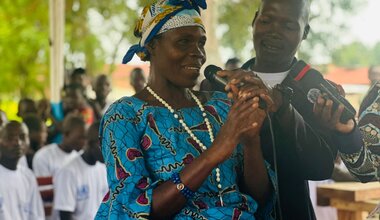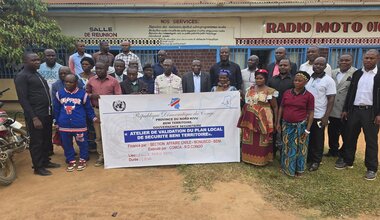Fataki: A Training Center to Reintegrate At-Risk Youth and Vulnerable Women
In a region still marked by insecurity, a joint initiative by MONUSCO and its partners offers a new perspective to one hundred beneficiaries in Fataki, in Djugu territory. Sixty vulnerable women and forty at-risk youth now have access to a vocational training center, inaugurated on June 15 through a Community Violence Reduction (CVR) project, in collaboration with the National Program for Disarmament, Demobilization, Community Recovery and Stabilization (PDDRCS) and the local NGO Women in Action for Multisectoral Development (FADEM).

Equipped with three training rooms, a carpentry workshop, a bakery oven, an administrative office and sanitation facilities, the center offers practical training in carpentry, baking and tailoring. This advancement has been welcomed by local authorities, who see it as a concrete lever for reintegration and social cohesion.
An Initiative Born from Community Dialogue
This project builds on discussions initiated in 2021 between armed groups and communities, supported by MONUSCO and provincial authorities. These exchanges led to an agreement to cease violence and define local priorities, among which was the creation of economic opportunities for youth and women.
"This center is the fruit of collective commitment," recalled MONUSCO Bunia office chief Josiah Obat, calling on communities to continue on the path of dialogue and living together. "All these different tribes are a wealth. In case of disagreement, dialogue. Here you have a framework to train, but also to get closer to each other," he emphasized.

Training to Rebuild
Beyond learning a trade, this project gives beneficiaries the means to take care of themselves and regain an active place in society. Dorcas, for example, can now sell her pastries at the market. "I'm delighted with this project. It allowed me to learn baking. I now know how to make fritters and cakes that I sell at the market. I can take care of myself without waiting for help from my husband," she confides.
Aline, trained in sewing, is preparing to make school uniforms: "Here in Fataki, there are few seamstresses. I learned to sew. With the school year approaching, I'm going to make uniforms for the village children. That will allow me to earn money and feed my family."
Others, like Grâce, who became a trainer, are now passing on their skills to other women.
These testimonies reflect a dynamic of change that goes beyond the simple framework of training. They embody a desire to build lasting peace through local initiatives.
A Response to Territorial Challenges
With a budget of $98,000 funded by MONUSCO through its DDR-S section, this project responds to a dual objective: offering a concrete alternative to precarity and reducing the attractiveness of armed groups. It is based on a participatory approach, integrating communities at each stage of its implementation.
Local authorities encourage ownership of this initiative. For Djugu territory administrator Ruffin Mapela,
this project strengthens social cohesion between communities, while building on local resources and skills.
In Fataki, the vocational training center illustrates the common commitment to sustainable solutions to violence. It is now up to the communities, with partner support, to make it a living space, a driver of transformation for the entire region.
 |
 |
 |
 |
 UN
UN United Nations Peacekeeping
United Nations Peacekeeping






